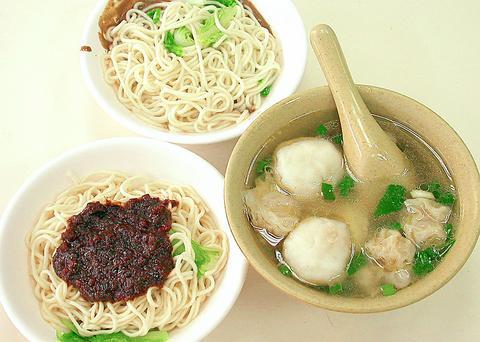Many of the first-time customers at Matsu Noodles Shop try to order "Matsu noodles," which they suppose is a type of noodles indigenous to the Matsu archipelago, one of Taiwan's outlying islands. There are in fact no Matsu-style noodles here and the name of the eatery was thought up ad hoc by its proprietress who happened to come from Matsu.
Located in a quieter section of Liaoning Street Night Market, the two-floor eatery is always crowded with all kinds of customers. Since opening over 10 years ago, the proprietress' family has pushed its business hours further and further into the night, finally opening 24 hours. Two years ago, it even expanded to include a neighboring two-floor space, which offers lunch boxes and rice dishes as well as noodles.
Matsu's noodles -- with pork sauce, sesame sauce, wonton, or sha-cha sauce -- do not sound much different from the menus of noodles stands everywhere, but their homemade recipes create a particular flavor that you won't find elsewhere. The sauces have a strong taste without being too greasy or heavy. The pork sauce mixes pork with pickled cucumbers. Both are so finely minced and mixed that the sauce has a rich flavor and blends well with the noodles. The sesame is finely ground in the sesame sauce. It is strongly fragrant and much less sweet than the usual kind. The sha-cha sauce is not greasy but highly appetizing. With a little bit of chili-pepper sauce, it taste even better.

PHOTO: VICO LEE, TAIPEI TIMES
Matsu's homemade wontons are relatively large and firm. A special way of wrapping the filling prevents the pork inside from losing its flavor when the wontons are served in soup. Noodles with oil is somewhat similar to the better-known Fuchou dry noodles, with its light taste and use of vegetable oil. This is a good choice if you want to taste the original flavor of Matsu's Fuchou-style noodles. All the noodles mentioned here come in large, medium and small sizes (NT$40, NT$35 and NT$25).
With mixed soup (NT$50), you can have a sampling of all the items Matsu is best at: two Fuchou fish balls with a filling of tasty pre-fried fish, some wontons and a smooth-tasting boiled egg. The eatery also has several homemade side dishes. Pork leg (NT$50), tender and light-tasting, is the most popular.

This is the year that the demographic crisis will begin to impact people’s lives. This will create pressures on treatment and hiring of foreigners. Regardless of whatever technological breakthroughs happen, the real value will come from digesting and productively applying existing technologies in new and creative ways. INTRODUCING BASIC SERVICES BREAKDOWNS At some point soon, we will begin to witness a breakdown in basic services. Initially, it will be limited and sporadic, but the frequency and newsworthiness of the incidents will only continue to accelerate dramatically in the coming years. Here in central Taiwan, many basic services are severely understaffed, and

Jan. 5 to Jan. 11 Of the more than 3,000km of sugar railway that once criss-crossed central and southern Taiwan, just 16.1km remain in operation today. By the time Dafydd Fell began photographing the network in earnest in 1994, it was already well past its heyday. The system had been significantly cut back, leaving behind abandoned stations, rusting rolling stock and crumbling facilities. This reduction continued during the five years of his documentation, adding urgency to his task. As passenger services had already ceased by then, Fell had to wait for the sugarcane harvest season each year, which typically ran from

It is a soulful folk song, filled with feeling and history: A love-stricken young man tells God about his hopes and dreams of happiness. Generations of Uighurs, the Turkic ethnic minority in China’s Xinjiang region, have played it at parties and weddings. But today, if they download it, play it or share it online, they risk ending up in prison. Besh pede, a popular Uighur folk ballad, is among dozens of Uighur-language songs that have been deemed “problematic” by Xinjiang authorities, according to a recording of a meeting held by police and other local officials in the historic city of Kashgar in

It’s a good thing that 2025 is over. Yes, I fully expect we will look back on the year with nostalgia, once we have experienced this year and 2027. Traditionally at New Years much discourse is devoted to discussing what happened the previous year. Let’s have a look at what didn’t happen. Many bad things did not happen. The People’s Republic of China (PRC) did not attack Taiwan. We didn’t have a massive, destructive earthquake or drought. We didn’t have a major human pandemic. No widespread unemployment or other destructive social events. Nothing serious was done about Taiwan’s swelling birth rate catastrophe.